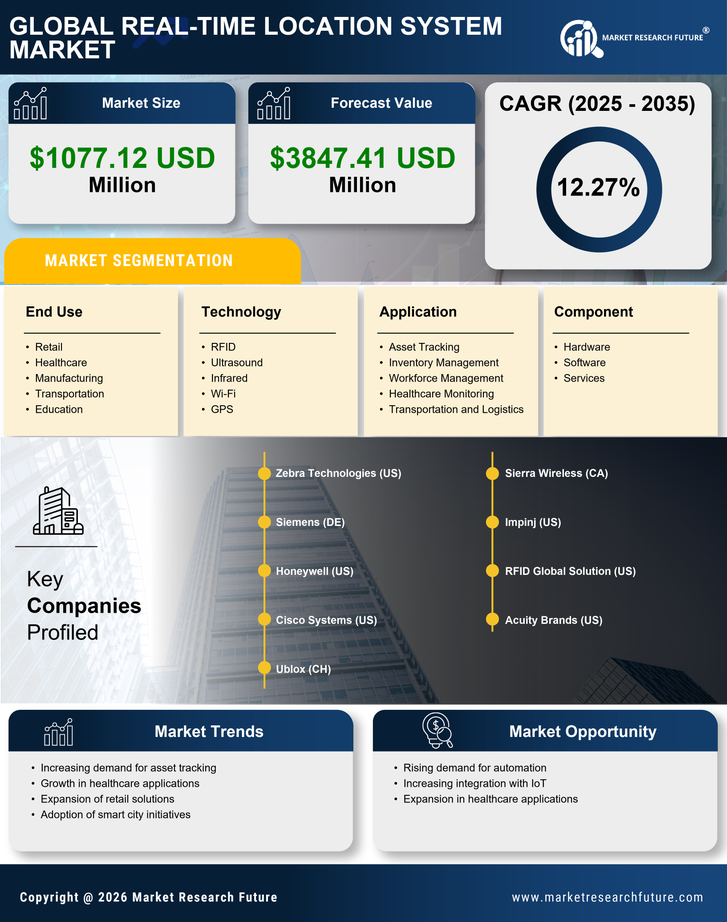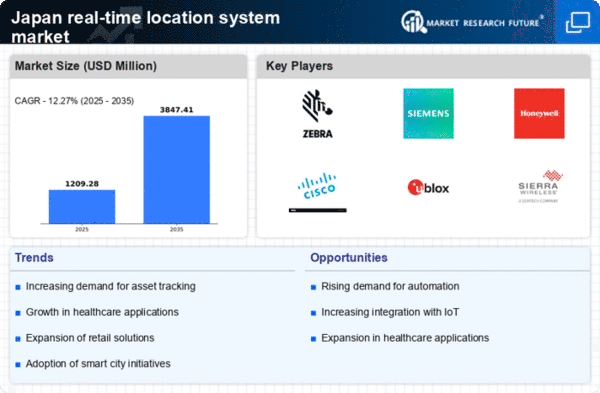Surge in Demand for Asset Tracking
The real time-location-system market in Japan experiences a notable surge in demand for asset tracking solutions across various sectors. Industries such as manufacturing, retail, and logistics are increasingly adopting these systems to enhance operational efficiency and reduce losses. According to recent data, the asset tracking segment is projected to grow at a CAGR of approximately 15% over the next five years. This growth is driven by the need for real-time visibility of assets, which helps organizations optimize inventory management and streamline supply chains. As companies seek to improve their competitive edge, the integration of real time-location systems becomes essential for effective asset management, thereby propelling the market forward.
Technological Advancements in IoT and AI
Technological advancements in the Internet of Things (IoT) and artificial intelligence (AI) are transforming the real time-location-system market in Japan. The convergence of these technologies enables more sophisticated location tracking and data analytics capabilities. As IoT devices become more prevalent, the ability to collect and analyze location data in real-time is significantly enhanced. This trend is expected to drive market growth, as organizations leverage AI algorithms to optimize location-based services and improve decision-making processes. The integration of AI with real time-location systems could lead to more personalized user experiences and operational efficiencies, thereby expanding the market's potential.
Growth of E-commerce and Retail Innovations
The rapid growth of e-commerce in Japan is a crucial driver for the real time-location-system market. As online shopping continues to gain traction, retailers are increasingly adopting location-based technologies to enhance customer experiences and streamline logistics. The demand for efficient last-mile delivery solutions is particularly high, prompting retailers to invest in real time-location systems that provide accurate tracking and delivery updates. Market analysis suggests that the e-commerce sector could reach ¥20 trillion by 2026, further fueling the need for innovative location solutions. This trend not only benefits retailers but also enhances consumer satisfaction, thereby driving the overall growth of the market.
Rising Need for Enhanced Safety and Security
In Japan, the increasing focus on safety and security is a significant driver for the real time-location-system market. Organizations across various sectors, including retail, healthcare, and public services, are prioritizing the implementation of location-based technologies to ensure the safety of personnel and assets. The market is witnessing a shift towards solutions that provide real-time alerts and monitoring capabilities. For example, the integration of real time-location systems in emergency response services is becoming more prevalent, as it allows for quicker response times and improved situational awareness. This heightened emphasis on safety is likely to propel market growth, as businesses seek to mitigate risks and enhance operational resilience.
Government Initiatives for Smart Infrastructure
The Japanese government is actively promoting smart infrastructure initiatives, which significantly impact the real time-location-system market. With investments in smart cities and digital transformation, the government aims to enhance urban mobility and public safety. For instance, the implementation of smart transportation systems is expected to increase the adoption of real time-location technologies. Reports indicate that public sector spending on smart infrastructure could reach ¥1 trillion by 2027, creating a favorable environment for the growth of the real time-location-system market. This alignment with government objectives not only fosters innovation but also encourages private sector participation, further driving market expansion.

















